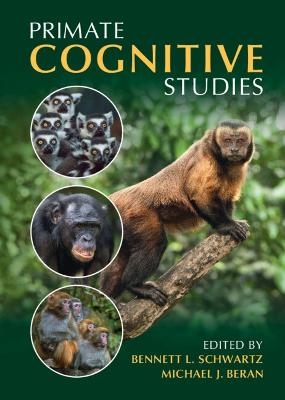
Primate Cognitive Studies
Cambridge University Press (Verlag)
978-1-108-84543-4 (ISBN)
Researchers have studied non-human primate cognition along different paths, including social cognition, planning and causal knowledge, spatial cognition and memory, and gestural communication, as well as comparative studies with humans. This volume describes how primate cognition is studied in labs, zoos, sanctuaries, and in the field, bringing together researchers examining similar issues in all of these settings and showing how each benefits from the others. Readers will discover how lab-based concepts play out in the real world of free primates. This book tackles pressing issues such as replicability, research ethics, and open science. With contributors from a broad range of comparative, cognitive, neuroscience, developmental, ecological, and ethological perspectives, the volume provides a state-of-the-art review pointing to new avenues for integrative research.
Bennett L. Schwartz is Professor of Psychology at Florida International University. He conducts research on human metacognition and memory and has published over 100 journal articles, books, and book chapters. He is currently Editor-in-Chief of New Ideas in Psychology and Associate Editor of Metacognition and Learning and Acta Psychologica. Michael J. Beran is Professor of Psychology and Co-Director of the Language Research Center at Georgia State University. He has published over 200 journal articles and fifty edited books and encyclopedias. He is the co-editor of Foundations of Metacognition (2012) and author of Self-control in Animals and People (2018).
1. The purpose of primate cognitive studies Bennett L. Schwartz and Michael J. Beran; 2. A history of primates studying primates David A. Washburn and Sarah G. Walters; 3. Genetic and environmental influences on Chimpanzee brain and cognition William D. Hopkins and Chet C. Sherwood; 4. The evolution of cognition in primates, including humans David A. Leavens; 5. State of the field: developmental primate cognition Eliza L. Nelson, Jacqueline Alvarez, Brenda Jimenez and Kasey Padron; 6. Current perspectives on primate perception Audrey E. Parrish and Christian Agrillo; 7. The comparative study of categorization J. David Smith, Brooke N. Jackson, Andres F. Sanchez, and Barbara A. Church; 8. Numerical cognition in non-human primates Sarah Jones and Jasmine Roman; 9. The natural history of primate spatial cognition: an organismic perspective Charles R. Menzel and Ken Sayers; 10. Progress and prospects in primate tool use and cognition Kathelijne Koops and Crickette Sanz; 11. Sequencing, artificial grammar, and recursion in primates Stephen Ferrigno; 12. The evolution of episodic cognition: the sense of time Gema Martin-Ordas; 13. Metacognition Victoria L. Templer; 14. Bridging the conceptual gap between inferential reasoning and problem solving in primates Josep Call; 15. The eyes have it: using non-invasive eye tracking to advance comparative social cognition research Lauren H. Howard and Elizabeth V. Lonsdorf; 16. Social cooperation in primates Stella R. Mayerhoff, Jhonatan M. Saldaña Santisteban and Sarah F. Brosnan; 17. Primate communication: affective, intentional, or both? Rafaela Heesen, Christine Sievers, Thibaud Gruber and Zanna Clay; 18. Theory of mind in nonhuman primates Laura S. Lewis and Christopher Krupenye; 19. A requiem for ape language research: the cognitive foundations of language Lisa A. Heimbauer and Mark A. Krause; 20. Primate empathy: a flexible and multi-componential phenomenon Jake S. Brooker, Christine E. Webb and Zanna Clay; 21. Replication and reproducibility in primate cognition research Benjamin G. Farrar, Christopher Krupenye, Alba Motes-Rodrigo, Claudio Tennie, Julia Fischer, Drew M. Altschul and Ljerka Ostojić; 22. Ethical considerations in conducting primate cognition research Stephen R. Ross, Jesse G. Leinwand, and Lydia M. Hopper; 23. Collaboration and open science initiatives in primate research Drew Altschul, Manuel Bohn, Charlotte Canteloup, Sonja J. Ebel, Daniel Hanus, R. Adriana Hernandez-Aguilar, Marine Joly, Stefanie Keupp, Miquel Llorente, Cathal O'Madagain, Christopher I. Petkov, Darby Proctor, Alba Motes-Rodrigo, Kirsten Sutherland, Anna Szabelska, Derry Taylor, Christoph J. Völter and Nicolás G. Wiggenhauser; 24. Studying primate cognition: from the wild to captivity and back Julia Fischer; 25. Do monkeys belong in the ape house? Comparing cognition across primate species Jennifer Vonk and Jared Edge.
| Erscheinungsdatum | 02.08.2022 |
|---|---|
| Zusatzinfo | Worked examples or Exercises |
| Verlagsort | Cambridge |
| Sprache | englisch |
| Maße | 175 x 251 mm |
| Gewicht | 1362 g |
| Themenwelt | Geisteswissenschaften ► Psychologie ► Allgemeine Psychologie |
| Geisteswissenschaften ► Psychologie ► Verhaltenstherapie | |
| Naturwissenschaften ► Biologie ► Zoologie | |
| ISBN-10 | 1-108-84543-6 / 1108845436 |
| ISBN-13 | 978-1-108-84543-4 / 9781108845434 |
| Zustand | Neuware |
| Informationen gemäß Produktsicherheitsverordnung (GPSR) | |
| Haben Sie eine Frage zum Produkt? |
aus dem Bereich


